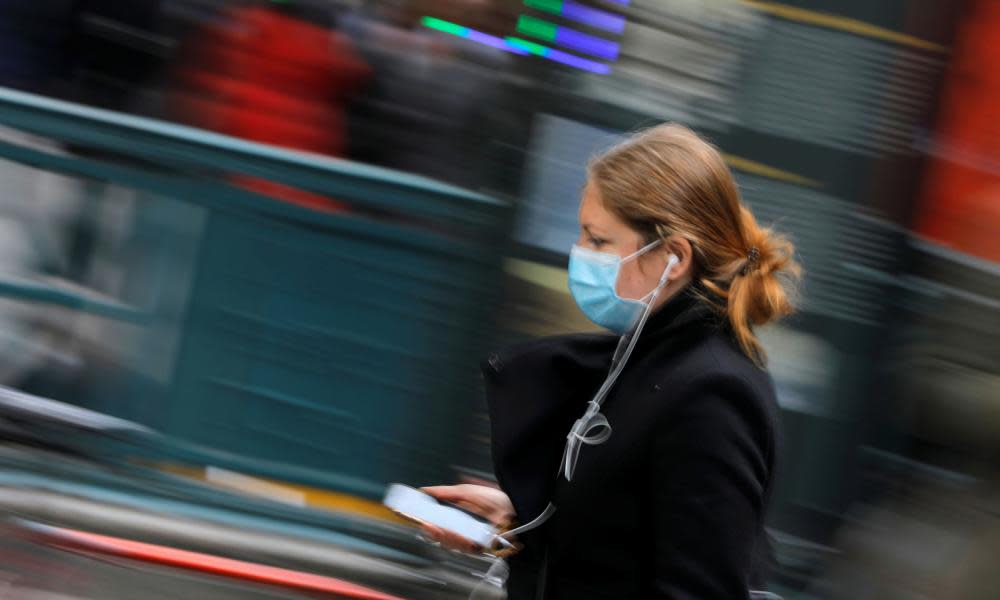Coronavirus pandemic exacerbates inequalities for women, UN warns

A global economy in freefall, 1.52 billion students stuck at home, dramatic swells in domestic violence reports and healthcare systems overwhelmed by a single disease all portend vicious side-effects for women during the Covid-19 pandemic, the United Nations warns.
“There is no single society where we’ve achieved equality between men and women, and so this pandemic is being layered on top of existing inequalities, and it’s exacerbating those inequalities,” Nahla Valji, the UN’s senior gender adviser to the executive office of the secretary general, told the Guardian.
Related: A tale of two New Yorks: pandemic lays bare a city's shocking inequities
The current public health emergency will probably mean a disproportionate economic impact for women, who often work in service industries hit hard by Covid-19. They also tend to take on the bulk of unpaid family care at home, a burden that has become even more all-consuming amid physical distancing and self-isolation.
And, even as women represent 70% of the global health workforce, the critical resources they need to stay well – reproductive health services, maternal care – may fall by the wayside as the world’s hospitals go into crisis mode. That, in turn, could lead to more maternal mortalities, young pregnancies and sexually transmitted diseases, according to a UN policy brief published on Thursday.
Because of the pandemic, the report said, “even the limited gains made in the past decades” toward gender equality “are at risk of being rolled back”.
In the US, the country with by far the most confirmed coronavirus cases, Covid-19 has already laid siege to people’s health and livelihoods. At least 16 million Americans have lost their jobs in the past three weeks. Layoffs and furloughs will probably continue as businesses remain shuttered and workers stay home.
default
Women are suffering heavy losses, data from the Fuller Project suggest. The majority of unemployment applicants in states such as New York, New Jersey, Virginia and Minnesota in mid- to late March were women, an alarming surge compared with past years.
This flood of applications coincided with school closures and stay-at-home orders, as children required near-constant attention and restaurants and other services shut down.
“If we take, for instance, the great recession, that is an economic crisis driven by economic factors, whereas this is an economic crisis which is driven by health factors,” said Xanthe Scharff, co-founder and CEO of the Fuller Project. “And that really changes the nature of the economic fallout, because at the heart of this is a need for social distancing.”
The very notion of isolation has disrupted the hospitality, retail and tourism industries that many women rely on for their livelihoods, according to the UN. And even after the economy reopens, those workers may still find themselves in dire straits: the UN projects “a prolonged dip in women’s incomes and labor force participation” because of Covid-19.
With a depleted job market, men who were in other, more lucrative industries may compete for roles traditionally filled by women, said Toni Van Pelt, president of the National Organization for Women. Women, however, will have to wait to search for work until their kids are settled at school and any sick family members get well.
“I foresee that there’ll be a scarcity of job openings available for women to take because they’re gonna lag behind in being able to access those jobs,” Van Pelt said.
Women are also facing existential threats to their safety and freedoms right now as domestic violence victims are constantly confined with their abusers and the pandemic threatens access to reproductive health care, the UN warned.
Violence against women has increased by more than 25% in many places around the world, according to the UN, and helplines in the US are already getting coronavirus-related calls from domestic abuse victims. Meanwhile, states already cool on abortion rights are trying to temporarily bar such operations for the time being.
“They’re using this virus to end women’s constitutional rights across the country,” said Van Pelt.
If there were more female leaders, the world might have been able to anticipate some of the crises it is facing now, such as an increase in violence against women, Valji suggested.
“The fact that we do not have women in leadership roles decision-making on the response to this pandemic means that we are missing huge pieces of information, of experience,” she said. “And that affects everybody.”
A statement from the US mission to the UN read, in part: “The United States recognizes the disproportionate impact that conflict and crises often have on women and girls. In the context of the Covid-19 pandemic, we have seen women around the world serving on the frontlines as medical professionals, emergency workers, caregivers and other essential personnel who are courageously stepping up and responding to the needs of those affected by the pandemic.”
It also acknowledged that measures such as stay-at-home orders “may further endanger” women and girls.

